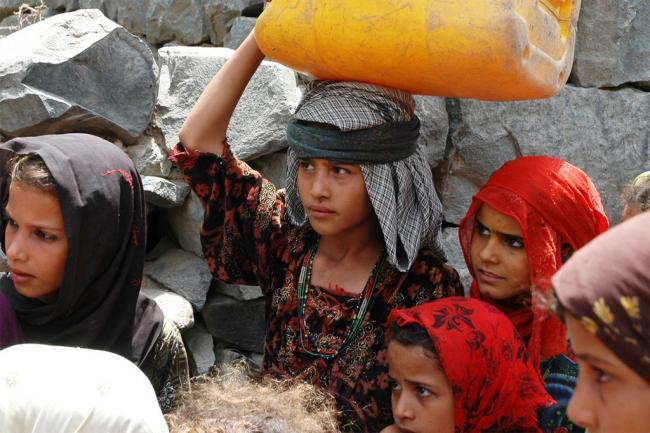
UN Envoy for Yemen announces cessation of hostilities and start date for peace talks
“I have previously emphasized that only a political solution and inclusive peace process will ensure a future of reconciliation and peace in the country,” said the Secretary-General's Special Envoy, Ismail Ould Cheikh Ahmed, at a press briefing in New York.
One year on into the conflict, the UN estimates that tens of thousands of Yemenis have been killed or injured, one in 10 are displaced and nearly the entire population is in urgent need of aid.
“The talks aim to reach a comprehensive agreement, which will end the conflict and allow the resumption of inclusive political dialogue in accordance with UN Security Council resolution 2216 (2015) and other relevant UN [Security Council] resolutions,” Ould Cheikh Ahmed said.
“The face-to-face negotiations will provide a mechanism for a return to a peaceful and orderly transition based on the [Gulf Cooperation Council] Initiative and National Dialogue outcomes,” he added.
Five main areas of the peace talks
The envoy further explained that the talks will focus on five main areas; he has asked the parties to present concept papers on each of them by 3 April.
the withdrawal of militias and armed groups
the handover of heavy weapons to the State
interim security arrangements
the restoration of state institutions and the resumption of inclusive political dialogue
the creation of a special committee for prisoners and detainees
To help Yemen preserve economic stability during this crisis, Ould Cheikh Ahmed has also pursued agreements which seek to preserve the functioning of key state institutions, such as the Central Bank, on which the Yemeni people depend.
“Preserving their functioning helps current service delivery to those who are in dire need, and will also facilitate a more expedient and efficient economic recovery after an agreement,” he noted. “The upcoming cessation of hostilities must also seek to ensure that the parties allow safe, rapid and unhindered access for humanitarian supplies to all affected governorates, as well as the increased flow of commercial shipments in the coming weeks,” he underscored.
Humanitarian breakthrough
Meanwhile, calling it a “breakthrough,” the UN refugee agency on Wednesday reported that earlier this week, 13 trucks managed to deliver blankets, mattresses, and other badly needed emergency relief items to Yemen's Taiz governorate.
It was the first time a convoy from the Office of the UN High Commissioner for Refugees (UNHCR) made it through all the way from Aden to Taizz, which is located in the highlands of country's southwest.
Dispatched in coordination with the Government of Yemen's High Relief Committee, it arrived on Sunday in Mashra'a Wa Hadnan, a district immediately south of the embattled Taizz city centre. Distribution is reportedly starting this week for 500 displaced people, others who have returned to Taiz, plus local families who have been affected by the conflict.
Meanwhile, another 13 trucks are on their way to nearby Sabir Al Mawadim district and will be distributed among another 500 families. In Mashra'a Wa Hadnan, the situation is now calm according to the UN, and some displaced families have been returning to their homes, while fighting persists on the eastern part of Sabir Al Mawadim.
“The two districts host over 7,500 displaced people. It is the first time that assistance has been delivered there using the direct route from Aden,” said UNHCR Representative in Yemen, Johannes van der Klaauw, in a press release.
“The wider governorate of Taizz hosts 555,048 internally displaced people, the biggest concentration in the country and equal to almost a quarter of the 2.4 million total Yemen-wide,” he added.
Credit: OCHA
Support Our Journalism
We cannot do without you.. your contribution supports unbiased journalism
IBNS is not driven by any ism- not wokeism, not racism, not skewed secularism, not hyper right-wing or left liberal ideals, nor by any hardline religious beliefs or hyper nationalism. We want to serve you good old objective news, as they are. We do not judge or preach. We let people decide for themselves. We only try to present factual and well-sourced news.







